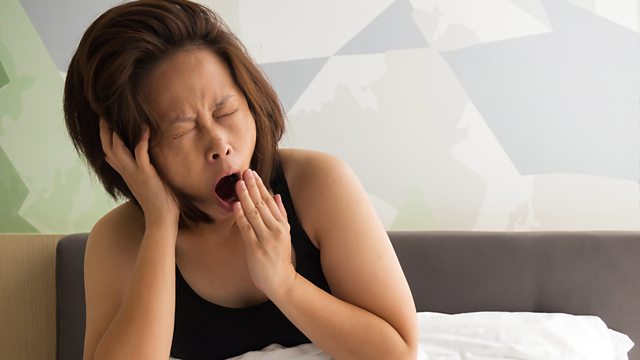Can we blame our genes for poor sleep?
Newly discovered links between our genetics and how we sleep; Naloxone kits in Scotland being used to reverse the effects of drug overdoses; How working nights can damage our DNA
Using data from the UK Biobank, the largest ever genetic study of its kind has discovered 47 links between our genetic code and the quality, quantity and timing of our sleep. Ten thousand people wore accelerators - Fitbit-like devices - when they went to bed. Accelerators detect when people are not moving and therefore more accurately record when people are asleep and awake, than when people self-report their sleep patterns.
The team at the University of Exeter Medical School, in the UK, examined about a million genetic variants and looked to see whether any of them were at higher frequency in those people that slept poorly. Geneticist Dr Mike Weedon is one of the senior authors of the study, which has just been published in the journal Nature Communications.
With a population of around 5 million people, Scotland has one of the highest drug-related death rates in Europe. The majority of these deaths involve opioids such as heroin, morphine and methadone.
Back in 2011 the Scottish Government responded to the situation by setting up a national programme supplying kits of naloxone, a medication which can reverse the effects of an opioid overdose within minutes. Recipients of the kit also receive a short training session on how to administer the drug in an emergency.
Eight years after the introduction of these kits, there has been a dramatic drop in the numbers of people dying from overdoses in one of the categories of people at high risk. For Health Check, Pauline Moore visits an addiction recovery cafe in the city of Glasgow.
It is already established that doing shift work overnight is bad for our health. But what about people who work during the daytime, but occasionally have to stay on and work a night as well, such as doctors working in hospitals. How are they affected? A team at Hong Kong University decided to study a group of doctors in order to investigate the damage caused by this type of sleep deprivation. The research has just been published in the journal Anaesthesia, and scientists Dr Gordon Wong and Dr Choi Siu Wai, tell Claudia about their findings.
(Photo caption: Woman yawning in bed – credit: Getty Images)
Health Check was presented by Claudia Hammond with comments from Dr Graham Easton
Producer: Helena Selby
Last on
Broadcasts
- Wed 10 Apr 2019 19:32GMT�������� World Service East and Southern Africa & West and Central Africa only
- Wed 10 Apr 2019 23:32GMT�������� World Service
- Thu 11 Apr 2019 04:32GMT�������� World Service Online, UK DAB/Freeview, News Internet & Europe and the Middle East only
- Thu 11 Apr 2019 05:32GMT�������� World Service Australasia, Americas and the Caribbean & South Asia only
- Thu 11 Apr 2019 06:32GMT�������� World Service East and Southern Africa & East Asia only
- Thu 11 Apr 2019 10:32GMT�������� World Service West and Central Africa
- Thu 11 Apr 2019 13:32GMT�������� World Service Australasia
- Thu 11 Apr 2019 17:32GMT�������� World Service South Asia
- Mon 15 Apr 2019 01:32GMT�������� World Service
Podcast
-
![]()
Health Check
Health issues and medical breakthroughs from around the world.


